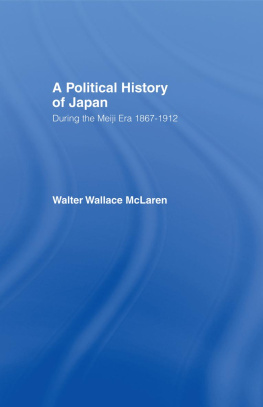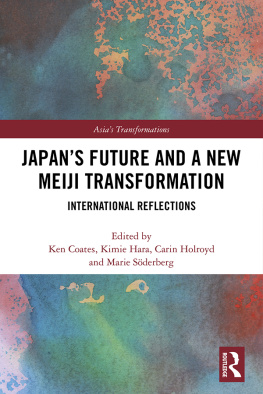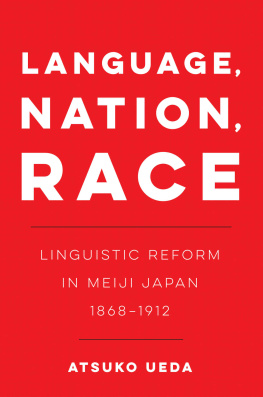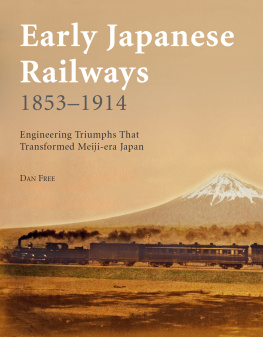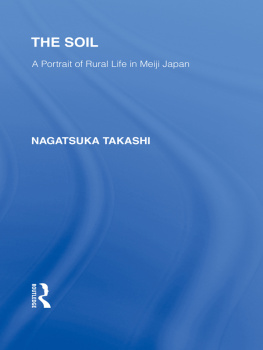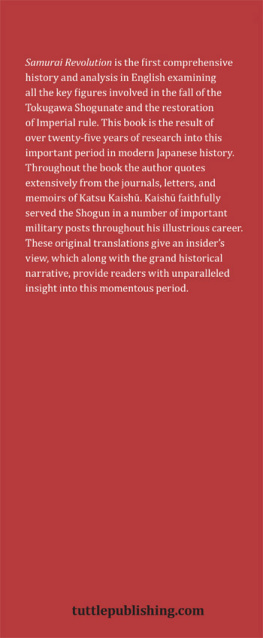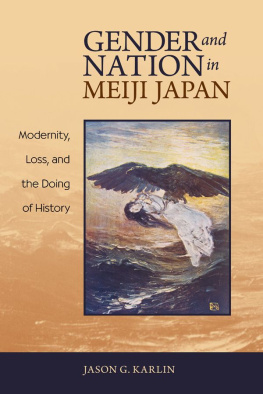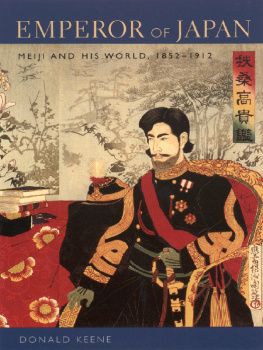First published 1916 by
Frank Cass & Co. Ltd.
Published 2013 by Routledge
2 Park Square, Milton Park, Abingdon, Oxon OX14 4RN
711 Third Avenue, New York, NY, 10017, USA
Routledge is an imprint of the Taylor & Francis Group, an informa business
ISBN 13: 978-0-714-62018-3 (hbk)
Publishers Note
The publisher has gone to great lengths to ensure the quality of this reprint but points out that some imperfections in the original may be apparent
AT no time since the Russo-Japanese War has the interest in Japans foreign policy been so widespread as at present, and seldom, if ever, has it been more difficult to comprehend Far Eastern affairs. In 1904 and 1905 the sympathy of the whole Anglo-Saxon world was given unreservedly to the Japanese in their struggle with Russia, mainly because it was popularly, though erroneously, believed that they were engaged in a quixotic enterprise, the aim of which was to defend the integrity of China and preserve the independence of Korea against the aggressive designs of the Colossus of Northern Europe. But during the past decade that judgment has been reversed, and the combat is now regarded as having been a war of expansion upon the part of Japan no less than that of Russia. Korea and the three Eastern provinces had been the prey of Russia, but as a result of the war they became the quarry of Japan. In what other light are subsequent eventsthe annexation of Korea and the consolidation of Japans interests in Manchuriato be interpreted?
Ever since September 1914 Japans action as a member of the Entente Allies group has been shrouded in mystery. The military expedition against Kiao-chau obviously was undertaken by the Japanese in order to rid themselves and their allies of the menace of a German naval base in the Pacific. But why was the successful issue of that exploit followed almost immediately by an attempt to settle their differences with China? And why were the Japanese terms presented at Peking so ambiguously worded that for the time being it was impossible to tell exactly what they were? Why was an ultimatum forwarded, and backed up by a display of force? And why did the Japanese Government at the very last moment withdraw the most objectionable group of its demands? These questions and many others of similar import were asked in almost every capital of the Western world, but no satisfactory answers were forthcoming from responsible authorities. In the House of Commons Sir Edward Grey said no more than that to the best of his knowledge no accurate version of the Japanese demands had been published. Was it that he did not know what they were at the time he spoke and had not been consulted or informed by the Japanese Foreign Office before the drive against China had been initiated? The State Department at Washington issued a brief statement to the effect that Japans action involved no breach of the existing treaties, a note which if not particularly informing was at least reassuring. Why was the British Foreign Secretary even less explicit? Had the Japanese Government violated the spirit of the Anglo-Japanese Alliance? If not, then the British Government must have approved all of Japans demands, Group V as well as the others.
In Japan itself there was almost as great uncertainty as to the significance of the Cabinets action at Peking. Were the demands and the ultimatum merely a device to win the support of a chauvinistic nation for the Government, a pre-election policy to be discarded as soon as it had served its purpose, or was it an outcome of the stampeding of the Cabinet by its strong-policy members? Some countenance is lent the former hypothesis by the fact that as soon as the election campaign had terminated successfully for the Government the drive upon China slackened; but if this interpretation be accepted, then why did the Cabinet, even though it enjoyed the support of a majority of the members of the Lower House, resign a few months later? Was Count Okumas resignation the consequence of his foreign policy, or of the bribery scandal which involved one of the members of his Cabinet, Baron Oura, the Minister of Agriculture and Commerce? If the former, who exerted the pressure? Certainly not the people, for there were no popular demonstrations of hostility against the Governments Chinese policy in Tokyo or elsewhere. Was it a case of the interference of the Elder Statesmen to curb the exuberance of the ultra-stalwarts, Oishi, Kono, and the others, in the Doshikai? If so, why did the Elder Statesmen, who are notoriously militarist in their sympathies, object to taking advantage of Chinas weakness and Europes preoccupation? Did they object to Okumas foreign policy because it was too strong or not strong enough? Or was it a warning from London or Washington that caused them to refrain from seizing the advantages almost within their grasp? Publicly, the downfall of the Okuma Cabinet was explained as the result solely of the discovery of Ouras guilt in disbursing 50,000 yen among the members of the Diet in the interests of the military partys programme for the creation of two new army divisions in Korea. But if such was the case, why was Baron Kato, the Minister of Foreign Affairs, as well as Oura left out of the reconstructed Okuma Cabinet? These are questions which the Japanese asked themselves and could not answer; for undoubtedly the failure of the Government to settle definitively with China was a real disappointment to the masses, to whom expansion on the continent of Asia is the first, last, and only object of foreign policy.
In this book I have endeavoured to supply the information which is essential to the formation of accurate judgments as to the meaning of Japanese policy by reviewing her modern political history, describing her system of government, and explaining her national ambitions. In , of the Transactions of that Society. I have been compelled to refer the reader to this source book for the texts of the essential documents because no other collection exists except in the Japanese language.
In , entitled The Parliamentary Rgime, I have followed the history of the Japanese Diet from its establishment in 1890 until the beginning of 1913. The political parties, their internal dissensions as well as their struggles with the various oligarchic Cabinets, have occupied a large part of my space, as have also the rise and growth of the military faction in the oligarchy. Why the brilliant exploits of arms have synchronized with the decline in the popular interest in domestic politics and the demoralization of the party politicians I have likewise attempted to explain.
Much of what is said may seem an unnecessarily severe indictment of the Japanese Constitutional Monarchy, but my severity is not unparalleled by Japanese opinion as expressed by their most influential writers. I have stated, for example, that bribery is a national institution, not in order to convey the impression that the Japanese differ in that respect, except perhaps in degree, from other peoples, but merely because the same conclusion has been drawn from the facts by the Japanese themselves. My main criticism of their system is directed against the appalling lack of principle displayed, not only in connection with their domestic but also their foreign policy. That there is a tendency toward an increase rather than a diminution of unprincipled action, and that a remedy will not be found except in an abatement of the intense chauvinism of the race,


